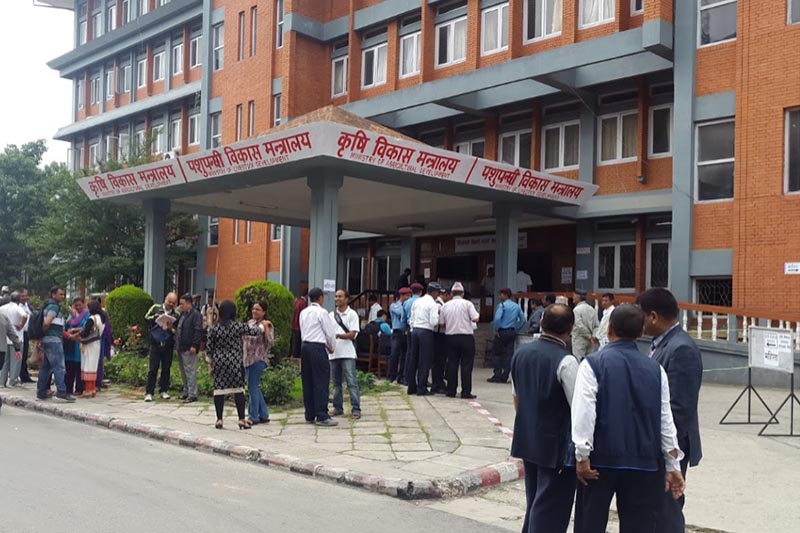MoALD agrees to revise bill on use, control of pesticide
Kathmandu, February 5
Ministry of Agriculture and Livestock Development has agreed to revise a draft bill related to the use and control of pesticides after lawmakers raised concerns about one of its provisions that allows the federal government to control use of pesticides.
In today’s meeting of the parliamentary Agriculture, Cooperative and Natural Resources Committee, lawmakers from both the ruling Nepal Communist Party (NCP) and the opposition Nepali Congress expressed reservations over the provision.
The issue got so complicated that the committee could not take any decision in the absence of the line minister and secretary. Later in the presence of Minister of Agriculture and Livestock Development Chakrapani Khanal and Secretary Yubak Dhoj GC, the panel agreed to include a provision that gives provincial governments authority to store and sell pesticides.
The parliamentary panel also directed the ministry to revise the draft bill and include provisions that give authority to provincial governments to issue, renew or scrap licences of pesticide distributors.
The panel’s chairperson Purna Kumari Subedi directed the ministry to bring a revised draft bill to the panel tomorrow for discussion.
Although the constitution gives such rights to provincial governments, the original draft bill gave all the rights to the federal government.
At the meeting, Secretary GC said even if provincial governments get the authority to store and sell pesticides, the federal government should have the right to import and destroy date-expired pesticides.
Under-secretary at the Ministry of Law, Justice and Parliamentary Affairs Purushotam Nepal also opined that the bill should have provision that empowers provincial governments to issue, renew and scrap licences of pesticide distributors. As per existing laws, distributors of pesticides should travel all the way to Kathmandu to acquire or renew their licence.
The new bill replaces Pesticide Act 1991 to regulate import, manufacture, sale, distribution and use of pesticides within the country with a view to prevent risks on human health and animals.
The draft bill also provisions formation of a pesticide management committee led by the secretary of the agriculture ministry. Four other members of the panel include two women representing pesticide user farmer community and experts related to forest and pesticides.
Ministry officials said the committee must have at least one forest expert as member,
The committee will have to meet at least once in six months.
As per the bill, provincial pesticide management committee will be formed by provincial governments to monitor use and distribution of pesticides.
The federal government should establish a storehouse in all provinces to store date-expired and useless pesticides.
Nepal has ratified the Stockholm Convention, Basel Convention and Rotterdam Convention to minimise environmental pollution and to manage agro-chemicals, including pesticides.
The government has banned 21 chemicals, including chlorden, DDT, dieldrin, endrin, aldrin, heptachlor, mirex, toxaphen, BHC, lindane, phosphamidon, organomercury fungicide, methyl parathion, monocrotophos due to their toxicity, persistence, tendencies of accumulation and biomagnifications and long-term impact on humans and the environment.
Minister Khanal told the panel that the government was not able to ban all pesticides keeping in mind the government’s target of doubling agriculture produce in the next five years. “We aim at reducing use of chemical fertiliser and increasing use of organic fertiliser in 10 years,” he said.
According to Nepal Health Research Council, exposure to pesticides is posing a serious threat to public health in developing countries.
According to Nepal Health Research Council, the trend of pesticide use is increasing in Nepal by 10 to 20 per cent every year.
Studies have shown that more than 90 per cent of the total pesticides are used in vegetable farming.






